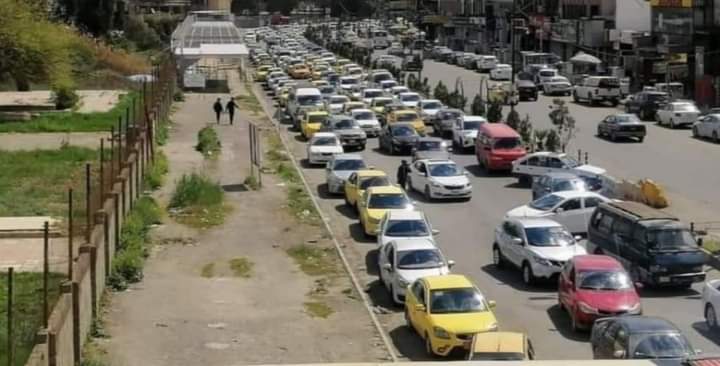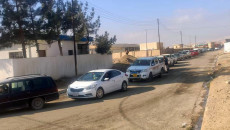Three kilometers away from the pumps of a state-subsidized gas station on the right side of Mosul, Ahmad al-Hayali, 28, sits inside his old black car. He says that he has been standing for more than half an hour and does not know how much time is left to get a chance to get a few liters to fill the tank of his thirsty car, according to the reading of the gas pump screen.
Temporary breakthrough
On February 18, young volunteers and activists in Mosul, raising empty jerrycans, stood at the gate of the Oil Products Company in Ninewa, a state body oversights supplying oil products, protesting against the repetitive and suffocating fuel crisis.
This protest resulted in the replacement of the director of Oil Products Company in Ninewa "Moadh Al-Nuaimi", who justified his stepping down with a sick leave that was published on social media.
This replacemet and the visit by the Director General of the Petroleum Products Company to Ninewa did not settle for only two or three days, so that the queues returned with greater momentum than before.
Stop smuggling!
While Al-Hayali turns off his car in order to save fuel, after he advanced several meters, he lights his cigarette and tells KirkukNow, "Everyone is talking about smuggling operations that cause the crisis, except for government officials."
In the midst of the crisis, the governor of Nineveh sent his representative to conduct a field tour of a number of petrol stations in Mosul. The mayor of Mosul, Amin Al-Fanash, spoke about measures and plans that will end the crisis within days, and the first step to achieve this was special fuel card for motorists of Ninewa.
As for the director of the governor's office, he beleives, "There are large numbers that visit Mosul daily, and this is one of the causes of the crisis, in addition to the vehicles from Kurdistan region, which is witnessing a rise in the prices of derivatives."
At the same time, the governor of Ninewa called for "gas to be provided to all people, regardless of whether they are from Mosul or come from elsewhere."
Saif al-Mashhadani, waiting behind Hayali, interferes when he hears the comments. "Let them control smuggling until the crisis is resolved," Al-Mashhadani said, tired of spending hours in the queue.
Activists and interested people attribute the causes of the crisis to filling stations smuggling a large part of their share to the region, which is witnessing a steady rise in fuel prices instead of distributing it to citizens.
The subsidized fuel policy is followed since many years in Iraq which had a central state-run policy in all sectors up to 2003, when Saddam Hussein was ousted as the Iraqi government through the public sector was providing all services.
Each motorist in Iraq, except Kurdistan region, can fill in his tank for 450IQD for a liter of gasoline (30 cents) one time in a day but there are no rules or restrictions to fuel more than once from different stations.
The main reason behind the fuel shortage in Mosul is that hundreds and even thousands of motorists driving from the northern provinces of Erbil and Duhok where the Kurdistan Regional Government KRG provides very limited quantity of subsidized fuel for 690IQD/liter which requires hours of queuing.
The crisis popped up last September when fuel prices in Iraqi Kurdistan region has mounted to 900-1,000 IQD/ liter (0,68 cents) per liter of gas, about 100-200IQDs up in a month. Following Russia invasion of Ukraine and severe up and downs in global oil markets, one liter of gas currently is sold at 1,000-1,200 IQD/liter in private petrol stations.
Is the fuel card a solution?
Once the demand is up for state subsidized gas in Ninewa or any part of the disputed territories, adjacent to Iraqi Kurdistan region, the local officials talk about the electronic fuel card and its magic in solving the crisis, but the citizens are tired of the routine registration and futile restrictive procedures.
“It is very important for those who adopt the fuel card and consider it a solution because it will oblige the citizen to a specific amount, whatever his need, which encourages the weak souls at the stations to trade in cards and exploit the needs of citizens, especially the civil stations that are skilled in deceit, and thus the spread of cards in the black-market after the demand for it goes up,” an employee of Ninewa oil products said on the condition of anonymity.
Al-Mashhadani disagrees with adopting the fuel card as a solution to the crisis and ignoring the real causes, describing all procedures as "patch works."
Is the quota enough?
Nineveh’s share of gasoline is close to two million liters per day, and what is often rumored by officials in the relevant department is that the quota is insufficient compared to the population density in the governorate in general, observers are pointing the accusation towards stations that do not commit to allocating their share in full and operate as little as possible.
They believe state gas stations do not operate all the pumps and deliberately cause crowding at their doors and reach the time when the product runs out to the time imposed by the local authority to close, three pm in the afternoon. Consequently, the rest of the share is invested illegally.
Iraq holds the second-largest oil reserves following Saudi Arabia but years of conflict and sanctions have left its refineries in dire straits, with the country now relying heavily on imports of oil products despite daily export of over three million barrels of crude oil a day.
In an attempt to reduce high demand on gas in the disputed territories, the Iraqi government has decided to raise cost of gasoline in some towns of the four Iraqi provinces adjacent to the Kurdistan Region, according to a letter addressed to the directorates of petroleum products distribution in those provinces.
The decision was directed by the Oil Products Distribution Company of the Iraqi Ministry of Oil to the provinces of Kirkuk, Ninewa, Diyala and Salahadin, and stipulated the provision of government-subsidized normal gasoline to petrol stations in the areas adjacent to the Kurdistan Region within the borders of those governorates at a price of 650 (USD0,44) Iraqi dinars instead of 450 (30 cents).
The disputed territories extend from Khanaqin in Diyala province on the border with Iran via Kirkuk up to Shingal, home to the Ezidi community, in Ninewa on the border with Syria where Baghdad and Erbil compete to expand their territories.
Ninewa MP, Shirwan Al-Dobardani, said, "The causes of the repeated crises in Nineveh must be identified and those responsible for this crisis must be held accountable, and we will act in this regard."
The local administration of Ninewa has decided to keep petrol stations open round the clock. There are 28 petrol station all over Ninewa province, 11 stations downtown in Mosul, center of Ninewa, and the rest in districts and sub-districts beside 130 private stations, according to the company for distribution of oil products.
In calculating the number of vehicles in Mosul, specialists expect that the number of vehicles in Ninewa province does not exceed one million motors including Ahmed's, who leaves desperately as the station closed its door, declaring that the product had run out after waiting for more than an hour, forcing him to head to the black market or private petrol stations to fill the tank of his car or to come back tomorrow and try his chance.






